Sri Lanka, strategically located in the Indian Ocean, has long been a focal point of geopolitical interest. The island nation’s foreign relations are shaped by its historical ties, economic interests, security concerns, and strategic position along major maritime routes. Here’s an overview of Sri Lanka’s key foreign relationships and its role in the international arena.
Relations with Neighboring Countries
- India:
- Historical Ties: India and Sri Lanka share deep historical, cultural, and religious ties. Buddhism, the predominant religion in Sri Lanka, originated in India.
- Economic Relations: India is one of Sri Lanka’s largest trading partners. The two countries have a Free Trade Agreement (FTA) and are working towards a Comprehensive Economic Partnership Agreement (CEPA).
- Security Cooperation: The two nations cooperate on maritime security to counteract piracy and ensure the safety of sea lanes in the Indian Ocean. India also provides defense training and equipment to Sri Lanka.
- Political Dynamics: Relations have been occasionally strained due to ethnic issues, particularly concerning the Tamil population in Sri Lanka and Tamil Nadu’s influence in Indian politics. However, both nations continue to work on maintaining a stable and cooperative relationship.
- China:
- Economic Investments: China has become a significant player in Sri Lanka’s economy through investments in infrastructure projects under the Belt and Road Initiative (BRI). Notable projects include the Hambantota Port and the Colombo Port City.
- Strategic Interests: China’s growing presence in Sri Lanka is part of its broader strategy to secure key maritime routes and expand its influence in the Indian Ocean region.
- Debt Concerns: Chinese loans for infrastructure projects have raised concerns about Sri Lanka’s debt sustainability and the potential for strategic leverage by China.
- Pakistan:
- Defense Cooperation: Pakistan and Sri Lanka have a strong defense relationship, with Pakistan providing military training and assistance.
- Trade and Investment: While economic ties are modest compared to those with India and China, both countries are exploring ways to enhance bilateral trade and investment.
Relations with Western Countries
- United States:
- Strategic Partnership: The U.S. views Sri Lanka as a key partner in promoting maritime security and stability in the Indo-Pacific region.
- Economic Aid: The U.S. provides development assistance and support for economic reforms, human rights, and governance.
- Geopolitical Interests: The U.S. aims to counter China’s influence in Sri Lanka and maintain freedom of navigation in the Indian Ocean.
- European Union:
- Trade Relations: The EU is a significant export market for Sri Lankan goods, particularly textiles and apparel. Sri Lanka benefits from the EU’s Generalized Scheme of Preferences Plus (GSP+) which provides preferential access to EU markets.
- Human Rights: The EU actively engages with Sri Lanka on issues related to human rights, democratic governance, and reconciliation following the end of the civil war.
Relations with Regional Organizations
- South Asian Association for Regional Cooperation (SAARC):
- Membership: Sri Lanka is a founding member of SAARC, which aims to promote regional cooperation and development in South Asia.
- Challenges: Political tensions between member states, particularly between India and Pakistan, often hamper the effectiveness of SAARC initiatives.
- Bay of Bengal Initiative for Multi-Sectoral Technical and Economic Cooperation (BIMSTEC):
- Cooperation: BIMSTEC focuses on regional collaboration in various sectors including trade, investment, transport, and security.
- Strategic Importance: Sri Lanka’s participation in BIMSTEC reflects its interest in enhancing connectivity and cooperation in the Bay of Bengal region.
International Organizations and Multilateral Relations
- United Nations:
- Peacekeeping: Sri Lanka contributes to UN peacekeeping missions worldwide.
- Human Rights: Sri Lanka engages with the UN Human Rights Council on issues related to post-conflict reconciliation and accountability.
- Commonwealth of Nations:
- Membership: As a member of the Commonwealth, Sri Lanka benefits from shared values and cooperation in areas such as education, governance, and development.
- Diplomatic Engagement: The Commonwealth provides a platform for Sri Lanka to engage with a diverse group of countries and promote its interests on a global stage.
Balancing Regional and Global Interests
- Non-Aligned Movement (NAM):
- Historical Context: Sri Lanka has been a member of the Non-Aligned Movement since its inception, advocating for neutrality and peaceful coexistence during the Cold War.
- Contemporary Relevance: While the global context has changed, Sri Lanka continues to emphasize a balanced foreign policy that avoids alignment with any major power bloc.
- Strategic Autonomy:
- Foreign Policy: Sri Lanka’s foreign policy aims to maintain strategic autonomy, balancing its relationships with major powers like India, China, and the United States to maximize economic and security benefits.
- Diplomatic Strategy: Engaging with multiple partners allows Sri Lanka to leverage its strategic location and enhance its geopolitical significance.
Challenges and Opportunities
- Economic Dependence: Reliance on foreign investments, particularly from China, poses challenges related to debt sustainability and economic sovereignty.
- Geopolitical Tensions: Navigating the complex dynamics between major powers in the Indian Ocean region requires careful diplomacy to avoid entanglement in larger geopolitical conflicts.
- Sustainable Development: Leveraging international partnerships for sustainable development and economic diversification remains a priority to ensure long-term prosperity and stability.
Sri Lanka’s foreign relations are characterized by a delicate balancing act between regional and global interests. As an island nation with a strategic location and rich cultural heritage, Sri Lanka continues to navigate its foreign policy with an emphasis on maintaining sovereignty, fostering economic growth, and contributing to regional and global stability.


